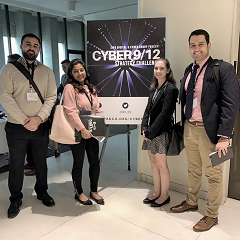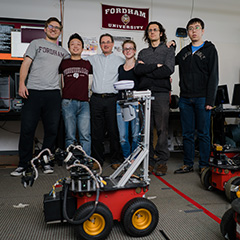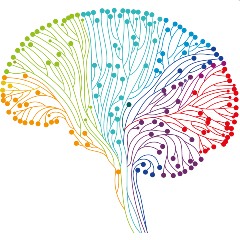CIS Research Labs
Fordham Center for Cybersecurity

The Fordham Center for Cybersecurity (FCC) is an interdisciplinary and interschool hub for cybersecurity education, research, and training. It provides current and future professionals with the knowledge and skills in various areas of cybersecurity, through research, degree programs, certificates, and participation in cyber competitions and community outreach. The FCC is University-wide and works with Fordham schools and departments to offer faculty and students a wide array of opportunities.
Thaier Hayajneh, Ph.D. is the founder and director of Fordham Center for Cybersecurity, University Professor, and director of the cybersecurity programs at Fordham University, New York. Prior to joining Fordham, he was a full-time faculty of computer science at New York Institute of Technology and founding director of NYIT Center of Excellence in Cyber Security (2014-2016). He also worked as Chair and Associate Professor at the Computer Engineering Department at the Hashemite University in Jordan (2009-2014). He received his Ph.D. and M.S. degrees in Information Sciences with specialization in cybersecurity and Networking from the University of Pittsburgh, PA. He also received his MS and BS in Electrical and Computer Engineering from Jordan University of Science and Technology, Irbid, Jordan, in 1999 and 1997, respectively.
Laboratory for Informatics and Data Mining

The Laboratory for Informatics and Data Mining in JMH 403 was founded in 2001. It conducts research on the emerging fields of computational intelligence and informatics in machine learning, data mining, information fusion, and knowledge discovery with real life application domains such as:
- bioinformatics, brain informatics, cognitive informatics, and neuroinformatics
- financial computing and informatics
- business analytics and business intelligence
- combinatorial fusion analysis with applications to above areas and expert systems, forecasting systems, prediction systems, decision systems and social network and network systems
Some current projects include:
- combining multiple forecasting experts for corporate revenue using CFA
- combinatorial fusion for improving portfolio management
- ChIP-seq analytics: combining multiple detection systems for improving ChIP-seq peak identification of protein binding sites
- DNA assembly using De Bruijn digraphs
- CFA in brain informatics: gender variation in cognitive facial judgment
- cognitive diversity in informatics vs correlation in statistics
The lab, led by Dr. Frank Hsu, Clavius Distinguished Professor of Science, includes Dr. Yanjun Li, Dr. Roger Tsai, Dr. Fei Yulian, Dr. Christina Schweikert, and graduate and undergraduate students. The lab is also looking for Fordham students from all disciplines and interests to join us in this exciting era to build an intelligent informatics ecosystem in the safe and smart world. The only requirement is an open mind, warm heart, and lots of passion. Please contact for further information or contact Dr. Frank Hsu about his research areas.
Laboratory for Robotics and Computer Vision

The laboratory is located on Fordham University's Rose Hill Campus in the Bronx, in room 320 of John Mulcahy Hall. Anyone interested in joining the lab should contact Dr. Lyons.
Educational Data Mining (EDM) Laboratory
The EDM Lab, co-directed by Dr. Daniel Leeds, Dr. Gary Weiss, and Dr. Yijun Zhao, applies data mining, machine learning, and other analytical techniques to educational data to learn about student academic performance and the educational process. Current and past research projects involve assessing instructor performance based on future student performance, mining common course sequences, applying network analysis methods to course graphs, predicting student academic performance, analyzing graduate letters of recommendation to identify gender and culture biases, and classifying text as being generated by ChatGPT or a human. The lab includes both undergraduate and graduate students from both Fordham campuses and welcomes new members.
The Computational Neuroscience Lab

The Computational Neuroscience Lab at 540 East 191st Street is directed by . It develops and uses methods in machine learning, computer vision, and neuroscience to create new computational models of human cognition. The lab explores object perception, memory, and reasoning using behavioral and neuroimaging data. Both undergraduate and graduate researchers contribute to the research. The lab is funded by personnel and equipment funds from Fordham University. Anyone interested in joining the lab should contact Dr. Leeds.